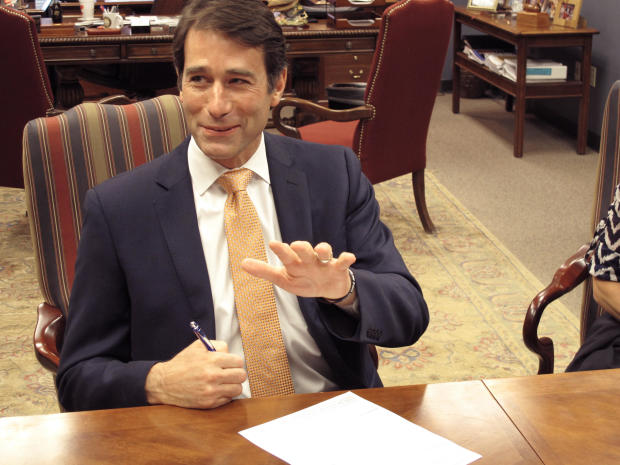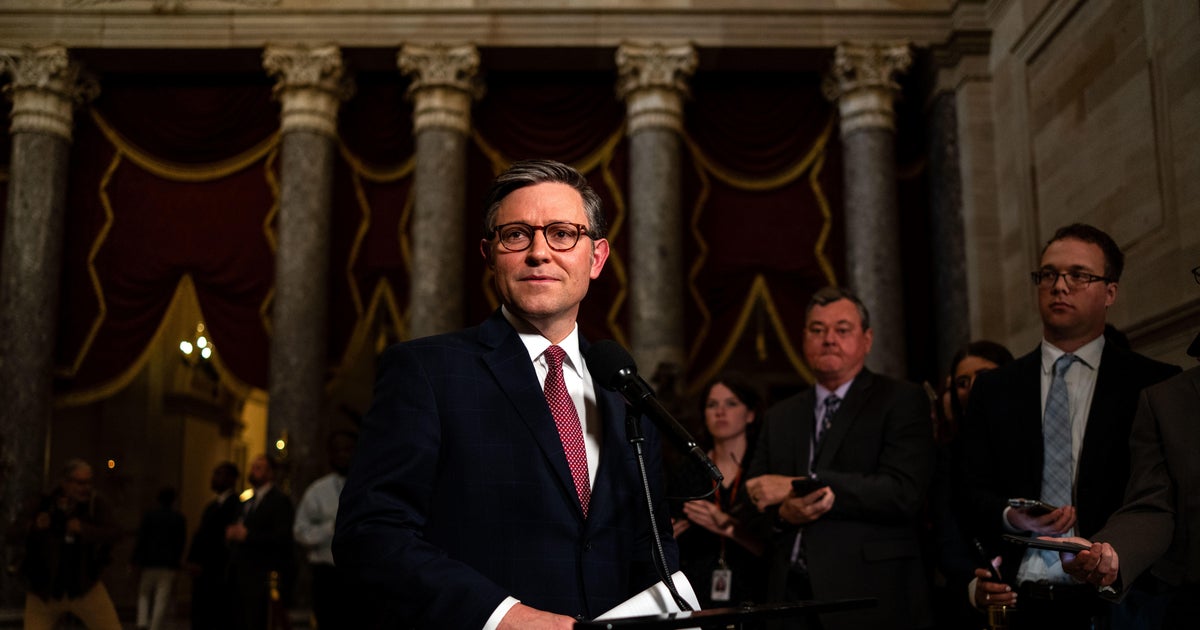Meet the GOP congressman trying to "redefine the narrative" on climate change
When Rep. Garret Graves of Louisiana was chosen to serve on a new House committee dedicated to climate change, the Environmental Defense Fund (EDF) supported the pick. In January he co-sponsored a conservation bill introduced in the House, and environmental groups have applauded his past work to protect and restore coastal communities. The third-term congressman says he believes "some components" of climate change can be considered a national emergency.
He's also a Republican.
"It's important that we redefine the narrative," Graves said in an interview with CBS News. "Do I think that there are components of what some view as climate change as being a crisis? Yeah. Yeah, I do."
Graves, 47, is the top GOP member on the newly appointed House Select Committee on the Climate Crisis, a pick conservatives applauded as "savvy."
"He's a really great member to take on a really complex challenge like this," said Rich Powell, executive director of Clear Path, a nonprofit advocating for conservative clean energy policies. "He's from a state that's right at the nexus of these issues."
Before his election to Congress in 2014, Graves served as chairman of the Louisiana Coastal Protection and Restoration Authority, a state agency established after Hurricane Katrina to protect and restore wetlands and shorelines. More recently, he's been pushing the Trump administration to finally provide relief funds for victims Louisiana's catastrophic 2016 floods.
His home state affords Graves a unique vantage point to witness the effects of climate change. Louisiana is prone to extreme weather, such as hurricanes and high coastal flooding that can lead to intense erosion. According to the EDF, the equivalent of a football field of land disappears into the Gulf of Mexico every 100 minutes.
"We've lost 2,000 square miles of our coast," Graves said. "If the state of Rhode Island lost 2,000 square miles, we'd have 49 states today."
According to a recent analysis by the federal government, Louisiana also ranks among the top 10 states in both crude oil reserves and annual crude oil production. The state's 17 oil refineries account for 20 percent of the country's refining capacity. But the industry has also come with some severely detrimental environmental costs, most notably the 2010 BP oil spill, which dumped an estimated 4.9 million barrels of crude oil into the Gulf.
Graves' connection to the fossil fuel industry has drawn scrutiny. Graves has received $515,634 in donations from the oil and gas industry over the past five years, according to campaign finance data compiled by Open Secrets. That amount is easily higher than the other five Republicans on the climate change committee, who have received an average of $108,773 in donations from the industry over the course of their careers.
Additionally, the League of Conservation Voters gave Graves' a grade of 0 percent on its 2018 environmental scorecard, meaning he voted against all legislation LCV deemed important for the environment. His overall lifetime score is just 3 percent.
"I think a 3 percent speaks for itself," said Tiernan Sittenfeld, the LCV's senior vice president for government affairs. "And it's pretty appalling."
Other Republicans on the panel don't fair much better. Virginia Rep. Morgan Griffith clocks in with the highest lifetime score of the group at 5 percent. Georgia Rep. Buddy Carter also has a score of 0 percent.
Graves' Democratic counterpart is Florida Rep. Kathy Castor, chairwoman of the House climate change committee.
"Mr. Graves represents a state and district that is bearing escalating costs from climate change, just like my district and the state of Florida," Castor said in a statement to CBS News. "These impacts do not discriminate based on political party."
The panel held its first session March 6. The special committee was created by House Speaker Nancy Pelosi in response to demands by freshmen progressive lawmakers, including New York Rep. Alexandria Ocasio-Cortez, who wasn't named to the panel.
The committee's mandate isn't as strong as those progressive members had hoped. For example, the group has no legislative authority or subpoena power. Democrats also criticized Republicans for naming members from coal country, like Carter and Rep. Carol Miller of West Virginia.
However, Graves sees the lack of legislative authority as a benefit, arguing it removes party politics from the committee's work.
"I really don't think this has to be a partisan issue, although it certainly can devolve to that," Graves said. "Let's learn a little bit more about the science, and de-politicize it so we can focus on the facts."
While climate change has become an integral part of Democrats' platform, Republicans have largely downplayed its effects and hampered efforts to reduce greenhouse gas emissions. But growing public awareness of the issue could spur some Republican policymakers to change their approach.
After Hurricane Michael devastated Florida in October 2018, a CBS News poll found 61 percent of Americans believed global warming exists and is caused mainly by human activity. That was seven percentage points higher than in April of the same year, and 21 percentage points higher than in 2011. A recent report by the Yale Program on Climate Change Communication found 73 percent of Americans say climate change is happening, an increase of 10 percentage points since March 2015.
According to Powell, of the Clear Path nonprofit, Republicans took notice of those upticks.
"We're sort of moved past the debate about whether this is a problem and we're now onto the spirited debate to find the solutions," Powell added.
There's additional evidence times are changing, with new progressive lawmakers in Congress forcing a conversation about climate change through proposals like the Green New Deal.
"We're obviously thrilled to have a pro-environment majority in the House," Sittenfeld of the LCV said. "We had more candidates than ever before who ran on clean energy and climate change. Now that they're in office they really want to act on them."
The Green New Deal has become a litmus test for Democrats vying for the party's presidential nomination in 2020. Graves said the Green New Deal "lacks a good deal of rationale," echoing the sentiments of most Republicans.
Environmental policy wasn't always so polarizing. In 1970, President Richard Nixon signed into law the landmark Clean Air Act, passed by Democratic majorities in both chambers of Congress. Twenty years later, Republican President George H. W. Bush put on the books amendments to the Clean Air Act that garnered widespread support on both sides of the aisle.
"We would love to get back to the place where environmental protections enjoy broad bipartisan support," Sittenfeld said. "We're encouraged that there are Republicans raising their hands and saying they want to be part of the solution and we certainly hope that more of their colleagues will join them."




